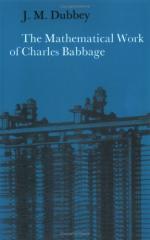|
This section contains 392 words (approx. 2 pages at 300 words per page) |
Encyclopedia of World Biography on Charles Babbage
Charles Babbage (1791-1871) was an English inventor and mathematician whose mathematical machines foreshadowed the modern computer. He was a pioneer in the scientific analysis of production systems.
Charles Babbage was born on Dec. 26, 1791, in Totnes, Devonshire. Much of his early education was under private tutors. In 1810 he matriculated at Trinity College, Cambridge. Appalled by the state of mathematical instruction there, Babbage helped to organize the Analytical Society, which played a decisive role in weakening the grip of blind Newton-worship at Cambridge and Oxford.
In 1814, the same year in which he took his degree, Babbage married Georgiana Whitmore. They had eight children, only three of whom survived to maturity. Mrs. Babbage died in 1827.
Mathematical Engines
In 1822 Babbage produced the first model of the calculating engine that would be the consuming interest of his life. The machine produced mathematical tables, and since its operation was based upon the mathematical theory of finite differences, he called it a "difference engine." The government was interested, and a vague promise of financial assistance encouraged Babbage to begin building a full-scale machine.
But he had underestimated the difficulties. Many of the precision machine tools needed to shape the wheels, gears, and cranks of the engine did not exist. Babbage and his craftsmen had to design them. The consequent delays worried the government, and the financial support was tied up in red tape.
Meanwhile the conception of a far grander engine had entered Babbage's restless brain, the "analytical engine." It would possess (in modern language) a feedback mechanism and would be able to perform any mathematical operation. Babbage asked the government for a decision on which engine to finish. After an 8-year pause for thought, the government indicated that it wanted neither.
Between bouts with the government and work on his engines, the versatile Babbage managed to squeeze in an incredible variety of activities. He wrote on mathematics, the decline of science in England, codes and ciphers, the rationalization of manufacturing processes, religion, archeology, tool design, and submarine navigation, among other subjects. He was Lucasian professor of mathematics at Cambridge for 10 years, but he was better known for his interminable campaign against organ-grinders in the streets of London.
Always he returned to his great engines, but none of them was ever finished. He died on Oct. 18, 1871, having played a prominent part in the 19th-century revival of British science.
|
This section contains 392 words (approx. 2 pages at 300 words per page) |


